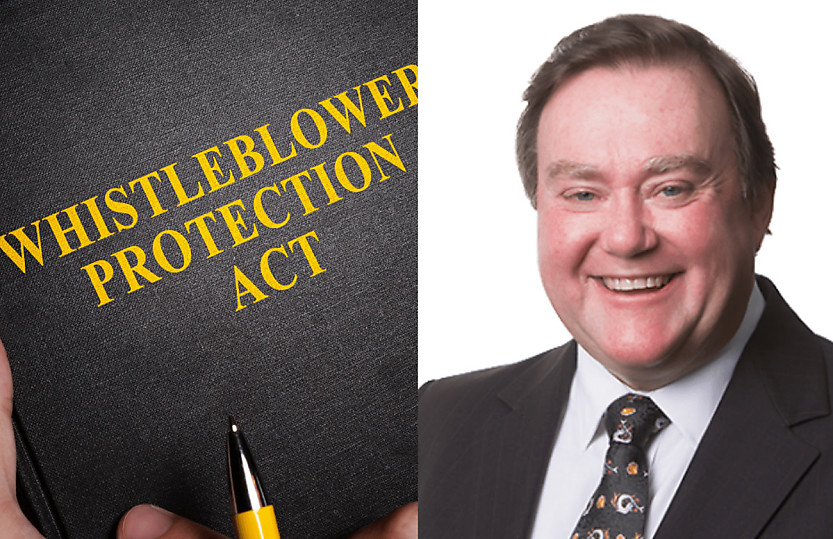‘I risked everything’: PwC whistleblower calls for independent commissioner

Tax lawyer turned Lendlease, PwC whistleblower Anthony Watson says a proposed TPB disclosure protection bill will not go far enough in protecting tax whistleblowers.
Whistleblower Anthony Watson has warned that the proposed whistleblower legislation crafted in the wake of the PwC tax leaks scandal will not adequately protect those who disclose wrongdoing by their employer.
The Treasury Laws Amendment (Tax Accountability and Fairness) Bill 2023 would protect whistleblowers who disclose information to the Tax Practitioners Board (TPB).
When introducing the bill to Parliament, Assistant Treasurer Stephen Jones said: “Today I am proud to introduce the biggest government crackdown on tax adviser misconduct in Australian history.”
“The government is appalled by the outrageous behaviour by PwC and the allegations about other firms in the consultancy sector more broadly,” he said.
Watson said the new protections simply perpetuate the issues, with similar protections afforded to those who bring news of employer misconduct to the Australian Taxation Office (ATO).
“A disclosure made to the TPB after commencement will not attract protection unless the whistleblower was victimised after commencement,” he submitted.
“It does not matter, and nor should it matter when the fraud was or is perpetrated, or when the whistleblower suffered.”
Appearing at a Senate hearing on the contents of the bill, TPB chair Peter de Cure said the broader protections for TPB whistleblowers would provide greater information for TPB investigations.
“It just removes that barrier and makes it clear that a person who wants to speak to us can do so with clarity of that whistleblower protection being available.
Jade Tyrrell, senior lawyer at the Human Rights Law Centre, warned the reform would “remove the current symmetry between these protections and private sector protections generally in the Corporations Act”.
The reform also borrows elements from the Public Interest Disclosure Act. Tyrrell said “the potential for overlap and shared coverage” was concerning, and instead pushed for a uniform whistleblower protection act and an independent whistleblower protection authority.
“It is extremely undesirable that a single whistleblower could potentially be covered by three significantly different whistleblower protection frameworks.”
Watson, a former partner at PwC-owned tax advisory firm, Greenwoods & Herbert Smith Freehills (GHSF), claimed he was forced out of the company after alleging the firm’s largest partner, Lendlease, had incorrectly claimed hundreds of millions of dollars in tax deductions.
He alleged the construction giant had been “double-dipping” over its tax claims on a $1.7 billion purchase of retirement villages.
“It was really just stealing from Australian taxpayers,” he told ABC News, adding he estimated the firm had wrongly obtained up to $300 million under the scheme.
After working with Lendlease for three decades, the firm took its business to PwC once Watson raised his concerns. Lendlease’s external auditor, KPMG, approved the accounts.
“Well, they either agreed to it or missed it. Now, if I’m an auditor, and I can see that Lendlease booked $260 million of other income in three years, I’d want to know what that was,” he told ABC News.
After losing the Lendlease account and then being terminated by GHSF, Watson took his concerns to company officials and a global tax partner at PwC. In one email, he said “the ATO will not fall for it!”
Nearly a decade later in 2021, this appeared to be true when Lendlease informed its investors it was being audited by the ATO over its retirement village tax treatment.
In February this year, Lendlease made another statement stating the audit of “the 2018 partial sale of the Retirement Living business” was ongoing.
Lendlease denied Watson’s allegations, adding: “We’re confident our tax treatment is consistent with the law and with the ATO’s 2002 tax ruling on the retirement living industry. We lodged our 2018 tax return on that basis and intend to vigorously defend our position, should the ATO not accept it.”
Watson took Lendlease and PwC to the Federal Court in 2022 and tried to make use of whistleblower protections that only took effect in 2019. The court denied the retrospective application of the laws to his case, but Watson has since lobbed fresh allegations against his former employer.
Appearing before the Senate hearing, Watson called out the financial services industry as a whole, claiming: “Things don’t change. What changes behaviour is the fear that the behaviour will become known. That’s why whistleblowers are so important.
“I suffered the indignation of being punted for calling a rort … Who is accused of wrongdoing is invariably a big corporate. They have deep pockets, and it’s not their money.
“I commenced my case against PwC and Lendlease in April 2022. Here we are, two years later, and we’ve spent millions of dollars on just one thing, which is: which set of whistleblower rules applies?”
Watson also urged the Senate to consider instating an independent whistleblower commissioner or authority.
“I risked everything and have in fact lost much in telling what happened. And because of the secrecy with the Tax Office –God bless them; they’re formidable but so slow – you can never find out what’s happening, unless you’ve got a source inside the wrongdoer,” he said.
“I think a whistleblower commissioner or authority, someone who will stand with the whistleblower and help him or her get it through, is needed.”






